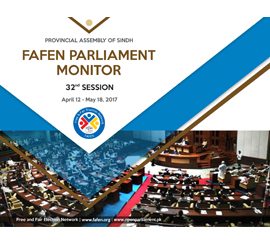ISLAMABAD, May 18, 2017: National Assembly’s 42nd session addressed its three quarters agenda approving nine legislative proposals and handing over 21 others to the relevant standing committees for review and recommendations. The legislation sent to the committees included a Constitutional Amendment to allocate 23 seats to Federally Administered Tribal Areas (FATA) in the Provincial Assembly of Khyber Pakhtunkhwa.
The session spanned over four sittings held between May 15 and May 18, 2017. The cumulative duration of the session was 13 hours and three minutes, however the proceedings remained suspended for an hour and three minutes due to prayer break and lack of quorum. The Speaker presided over nearly half (49%) proceedings while the Deputy Speaker chaired the rest. The Prime Minister did not attend the session as he is on six- day official visit to the People’s Republic of China. The Leader of the Opposition attended three sittings and remained present for three hours and 29 minutes (29% of the session). On average, every sitting started 17 minutes behind its scheduled time and was attended by 217 lawmakers. The average attendance at the commencement of each sitting was 46 and at conclusion of the sitting was 43. The parliamentary leaders of PTI, PML-F and NP did not attend the session while the leader of PML-Z attended all sittings of the session. The leaders of QWP-S, JUI-F, Jl, AMLP, PPPP and PkMAP attended three sittings each.
The legislative business before the House during this session comprised 54 bills of which more than three quarters (42) were initiated by private lawmakers. Twelve bills (11 Private and One Government) were deferred for a later time. One of the Private Members’ bills was dropped due to absence of the mover and three others were withdrawn by the members in-charge after being opposed by the government. A government bill was left unaddressed. Seven of 54 bills had been received from the Senate including three government bills which were previously approved by the National Assembly but Senate passed them with amendments.
The government legislation focused on FATA reforms, child protection, alternate dispute resolution mechanism, food safety and economic regulations. The private members’ bills related to electoral issues, counter-terrorism, education, accountability, reforms in justice delivery, human rights, health and governance.
The lawmakers debated the legislation concerning FATA reforms for two hours and 37 minutes. Seventeen members took part in the debate. Moreover, three lawmakers discussed the National School of Public Policy (Amendment) Bill, 2017. No discussion took place on other laws passed by the House or introduced before it.
There were five resolutions by individual members and one by the government on Orders of the Day. The House did not address any of these resolutions. The government resolutions sought extension in an ordinance while the private lawmakers’ resolutions demanded government’s action on spurious drugs, child beggar, problems of overseas Pakistanis, electricity load shedding and increase in the exports. These public importance resolutions were sponsored by lawmakers of PPPP, JUI, PML-N, MQM and PTI. However, the House adopted two supplementary resolutions supported by members belonging to both side of the aisle. These resolutions condemned the attack on Deputy Chairman in Mastung and killings of labourers in Gwadar.
A woman legislator belonging to JUI-F proposed three amendments to the National Assembly’s Rules of Procedure and Conduct of Business. These amendments aimed to allow taking up Adjournment Motions during the debate on annual Presidential Address to the Parliament and to limit this debate to two sessions of the Assembly. Presently, the debate remains on the agenda for several sessions. Moreover, third amendment sought to amend rule regarding reports of sub-committees of the Assembly’s committees. These amendments were referred to the relevant standing committee for further deliberations.
The Question Hour was held in two sittings during the session while once it was suspended to take up supplementary agenda. A total of 151 questions (105 Starred and 46 Unstarred) of 52 lawmakers were listed for answers. These questions were addressed to 17 ministries of the government. A starred question is replied orally as well as in writing while the unstarred is answered only in writing. Only a quarter of starred questions (27) were taken up for oral answers.
Six Calling Attention Notices were included in the agenda on issues relating to excessive use of anti-biotics, insufficient educational facilities in Islamabad, delay in processing of housing schemes, disbursement of loans under Prime Ministers’ Youth Programme, higher mark-up rates for agricultural loans than industrial loans and censorship on social media. The House took up five of these CANs for ministerial statements. The issue of social media censorship remained unaddressed. Three CANs were submitted by PML-N legislators and one each by lawmakers belonging to PPP, PTI and JUI-F one each.
The standing committees returned 12 legislative proposals to the Assembly with their recommendations. These bills have been pending with the standing committees on Interior and Narcotics Control; Law and Justice; and Defence and Parliamentary Committee on Electoral Reforms.
The lawmakers submitted five Motions under Rule 259 to discuss to discuss unavailability of clean drinking water in Islamabad, reforms in legal aid system, spurious medicines, excessive electricity billing and increasing population of the country. But none of these motions were taken up for discussion during the session.
The four-sitting session witnessed two instances of walkout by opposition lawmakers. Once, the MQM legislators staged a walkout against K-Electric company and prolonged electricity outages in Karachi. The second instance was when the lawmakers of all opposition parties left the House to protest against remarks of a Federal Minister about role of PTI’s woman lawmaker in a sit-in outside Peshawar Electric Supply Company. The remarks, however, were expunged by the Chair.
The quorum issue surfaced during the last sitting of the session when entire opposition was on a walkout. On identification by a PTI lawmaker, the House was found out of quorum and proceedings remained were suspended for 27 minutes. The one-fourth membership was still not present on resumption of the proceedings leading to prorogation of the session.


